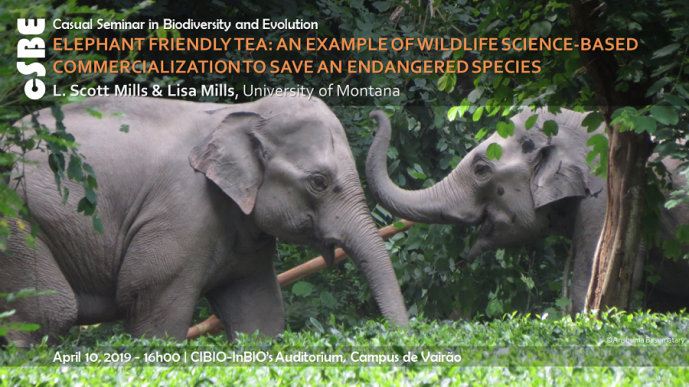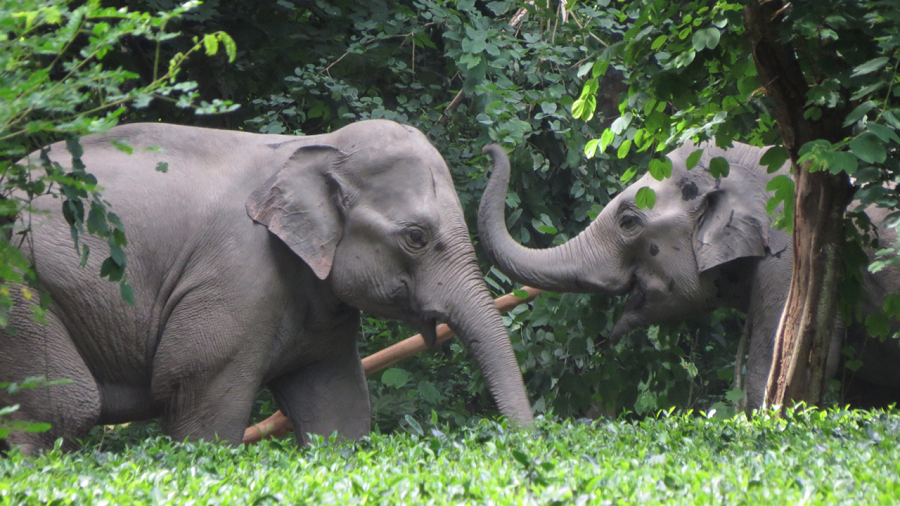ELEPHANT FRIENDLY TEA: AN EXAMPLE OF WILDLIFE SCIENCE-BASED COMMERCIALIZATION TO SAVE AN ENDANGERED SPECIES

CASUAL SEMINAR IN BIODIVERSITY AND EVOLUTION

Globally, 2 billion cups of tea are consumed every day, the second most consumed beverage on the planet after water. Almost none of these tea consumers realize that tea can be a death crop helping to drive Asian elephants extinct. Building on our applied population ecology research and local outreach in the India-Bhutan region, we have: a) identified tea production practices that drive elephant mortality; b) identified specific actions to reverse those impacts; c) and incentivized those conservation-relevant tea farming practices through a novel “Elephant Friendly Tea” (EFT) Certification. Through our program tea estate owners who implement EFT actions receive a price premium for their tea, which is then sold under a Certified EFT logo; in turn, global tea consumers have a direct opportunity to support science-based elephant conservation with every cup of tea. We expect EFT to be game-changing for arresting the decline of Asian elephants because -- unlike traditional conservation approaches -- it both implements incentive-based conservation actions on and around the private agricultural lands where most elephants are killed, and it will create profits that we will fully invest into research and conservation actions across the elephant’s range. Critical partners to development of EFT include local villagers and tea professionals, the non-profit certification group Wildlife Friendly Enterprise Network, and University of Montana (who will manage the “EFT Elephant Research and Conservation Fund” created by EFT sales). We believe this model has great potential to address seemingly intractable conservation problems globally by developing meaningful win-win wildlife friendly enterprises.
Prof. Scott Mills is Associate Vice President of Research for Global Change and Sustainability, and a Wildlife Biology Professor at the University of Montana (UMONTANA), United States of America. From 2013 to 2016 he coordinated cross-cutting research initiatives on Global Environmental Change and Human Well-Being as a Chancellor’s Faculty Excellence Professor at North Carolina State University. His research has led to key advances in applying ecological science to wildlife conservation through a research program that crosses scientific disciplines. Some highlights of Prof. Mills’ research include integrating genetics and demography to understand persistence of wild species, developing new methods for non-invasive abundance estimation and monitoring of population trend, and many field studies to understand ecological and evolutionary responses of wild animals to human-caused global changes. Prof. Mills was an early pioneer in the development and application of non-invasive sampling of elusive wildlife, and currently has international research projects in Sweden, Scotland, Bhutan, and India. He authored two seminal papers defining the keystone species concept that have together been cited >2,800 times, and has conducted population ecology research on carnivores and other species globally. Prof. Mills has received numerous teaching awards, mentored 26 graduate and 34 undergraduate research projects, and published two editions of the acclaimed applied population ecology textbook “Conservation of Wildlife Populations: Demography, Genetics, and Management”. He has 140 SCI papers, several books and chapters (H-index=45; >11,000 citations). Dr. Mills has testified to the U.S. Congress on the role of scientific tools in monitoring wildlife populations, was a contributing author to the 2007 IPCC report, received an NSF Early Career Award, and is a John Simon Guggenheim Fellow for his work in Bhutan.
Lisa Mills has a Masters Degree in Education and a Bachelor in Science Education, Biology Emphasis. Her main activity is Science Outreach. She conducted several science-based educational outreach programs focused on wildlife conservation. Served as Co-PI: Elephants on the Line, A Community-based Conservation and Human-Elephant Conflict Program (USFWS Asian Elephant Conservation Fund). Served as coordinator, Maasai Twiga Trackers Program, a citizen science/tribal youth study of local giraffe populations on Maasai tribal community lands, Kenya, Africa. Coordinator of the REAP Program, a research and education internship program for undergraduates in partnership with the North Carolina Museum of Natural Sciences. Currently, she is the Manager of Wildlife Conservation Outreach Program at the University of Montana, and conducts outreach focusing on innovative approaches to wildlife conservation of at-risk species. She is also the founder and the current manager of the Elephant Friendly™ partnership.
[Host: Paulo Célio Alves, Conservation Genetics and Wildlife Management]
Image credis: Anshuma Basumatary